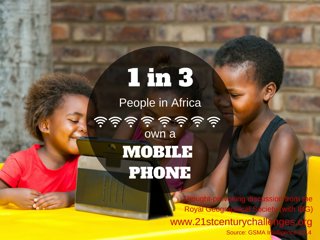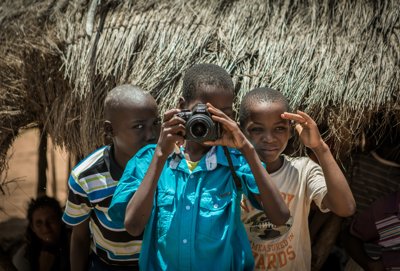What’s the challenge?
Africa has become a hub for innovation and digital communications. What technologies are out there and are they improving access to education and infrastructure? Can digital technology can help address this challenge? Would overcoming Africa’s digital divide help tackle the more fundamental development gap?
These resources focus students to look at technological leap-frogging and how Africa's over-dependency on natural resources has shifted towards greater a utilisation of human resources.

The Royal Geographical Society (with IBG) held a panel discussion on 10 May 2011 to discuss the issue.
Hear about this challenge from:
Rory Cellan-Jones, BBC
Rory Cellan-Jones has been a reporter for the BBC for more than two decades, covering business and technology stories for much of that time. He has been watching the technology scene like a hawk for the last 15 years. From the dotcom bubble of the late 1990s to the rise of Google and Facebook, from the Psion organiser to the iPad, he’s covered all the big gadget and business stories, and interviewed just about everyone who’s played a part in the story of the web. Dot.Rory, his previous blog, was named among the Top 100 blogs by the Sunday Times. He aims to look at the impact of the internet and digital technology on our lives and businesses. Rory has been described as “the non-geek’s geek”, and freely admits that he came late to technology – but he aims to explain its significance to anyone with an interest in the subject.
His on-screen career began as reporter for Wales Today in Cardiff, from where he moved to London as a reporter on Breakfast Time. He quickly transferred to business coverage, working across the BBC’s output from the Money Programme to Newsnight, from the Today programme to the Ten O Clock News. The stories he has covered range from Black Wednesday and the Maxwell trial to the dot com bubble and the rise of Google to the growth of the internet in Africa.
BBC: Connected Africa series. In 2000 he was briefly the BBC’s Internet Correspondent before returning to his post as Business and Industry Correspondent after the dot com bubble burst. At the beginning of 2007 he was appointed Technology Correspondent with a brief to expand the BBC’s coverage of the impact of the internet on business and society. He now covers technology for television, radio and the BBC website. He also blogs regularly on “dot rory”, the BBC’s popular technology blog, named recently as one of the Sunday Times Top 100 blogs, and is a prolific Twitterer – you can follow him at twitter.com/ruskin147. And whenever there is a new gadget or useful website to try, Rory is likely to be experimenting with ways of using the new tools in his journalism. In 2011, he presented a major series for Radio 4, The Secret History of Social Networking. He is also the author of “Dot Bomb”, a critically acclaimed account of Britain’s dot com bubble.
One Laptop Per Child
Professor Nicholas Negroponte, Founder and Chairman
Nicholas Negroponte is an internet pioneer, author, and man of grand visions including One Laptop Per Child (OLPC) a non-profit organisation to bring low-cost computing and education to the poorest regions of the world.
A graduate of MIT, Negroponte was a pioneer in the field of computer-aided design, and has been a member of the MIT faculty since 1966. Conceived in 1980, the Media Laboratory opened its doors in 1985. He is also author of the 1995 best seller, Being Digital, which has been translated into more than 40 languages. In the private sector, Nicholas Negroponte serves on the board of directors for Motorola, Inc. and as general partner in a venture capital firm specializing in digital technologies for information and entertainment. He has provided start-up funds for more than 40 companies, including Wired magazine. Twitter @OLPC @nnegroponte
Ushahidi
Erik Hersman, Co-Founder of Ushahidi, Afrigadget and iHub – Nairobi’s innovation hub
Erik Hersman is a key member of the African blog revolution including AfriGadget and WhiteAfrican. As a builder of Ushahidi, he helps expand the power of everyday people to share vital news via text. Erik Hersman is an international technology influencer with a keen eye on the impact of web and mobile technology innovation across Africa. Raised in Sudan and Kenya, Erik brings unique energy and insight to the world of technology and innovation – bridging the gap between Africa and Silicon Valley. He has a B.S. in Business Management from Florida State University. As part of the Ushahidi strategy he has been building the iHub (Nairobi’s innovation hub) since early 2010, a place that has grown to 3000+ Kenyan developers, designers, and entrepreneurs with connections in the corporate, academic and investor sectors.
An avid blogger, Erik writes two influential blogs: WhiteAfrican, where he writes about technology on the African continent, and AfriGadget, a group blog that celebrates African ingenuity. He is frequently a speaker at meetings and conferences dealing with technology in Africa, mapping, blogging and web application development, including; TED, PopTech, DEMO, Picnic, SXSW, Where 2.0 and Web 2.0. He is a TED Senior Fellow, a PopTech Faculty Fellow, sits on the Safaricom Innovation Board and is a founding organizer of Maker Faire Africa.
Erik grew up in Kenya and Sudan and is, as he puts it, “one of those guys who’s much more ‘at home’ in Africa.” From his home in the US, During the Kenyan post-election crisis of 2007-2008, Hersman helped create the website Ushahidi, a place to report incidents of violence via the web and texts. The original Ushahidi tool was written in two days; later that year, it won the NetSquared Mashup Challenge (and a nice check to help further development). Now the Ushahidi team’s next project is to build the Ushahidi Engine, a free and open-source tool for crowdsourcing information and seeing communities online. Twitter @whiteafrican @ushahidi
theSOFTtribe
Herman Chinery-Hesse, Founder and Chairman, theSOFTtribe, Ghana
The BBC has described Herman as Africa’s “Bill Gates”. Herman believes that: “If Africa misses the current global IT boat, there may never again be an opportunity for rapid wealth creation on the continent.” Herman is a software engineer by profession. 19 years ago he co-founded theSOFTtribe, one of the leading software houses in West Africa. theSOFTtribe has won a number of awards, including the prestigious Millennium Excellence Awards for IT in 2005 (also nominated in 2000). The company has been featured on BBC, CNN and the IEEE Magazine (of the United States) amongst others.
The BBC has described Herman as Africa’s “Bill Gates”. Herman believes that: “If Africa misses the current global IT boat, there may never again be an opportunity for rapid wealth creation on the continent.” He holds a number of directorships and is an Assessor of the Commercial Court, Ghana. He has won a number of personal awards including Outstanding Ghanaian Professional from the GPA Awards (UK), as well as the Distinguished Alumnus Award from the Texas State Alumni Association and Texas State University-San Marcos (USA)—the first and currently only African recipient of the award.
Herman has also been a resource person and visiting speaker at the Wharton Business School, Harvard Business Schools, Cambridge University, the University of Ghana, and the TEDGlobal Conference in Arusha, Tanzania, amongst others. Herman believes: “Technology is the only way for Africa to get rich. We don’t have proper infrastructure and we can’t compete in manufacturing. But if you put me behind a PC and tell me to write software for a Chinese customer, then I can compete brain for brain with anyone trying to do the same thing in the US.” theSOFTtribe employs around 70 people and has a client base of more than 250 organisations, including major multinationals such as the Ford Foundation, Nestlé, and Unilever; it is also a Microsoft development partner in the region.
ICT4D: Professor Tim Unwin, Professor of Geography and UNESCO Chair in ICT4D
FrontlineSMS: Ken Banks, Technologist, anthropologist Tech Awards Laureate 2009
The wind-up radio: Trevor Baylis OBE, Inventor of the wind-up radio
Lord Paul Boateng, Former High Commissioner to South Africa
Further reading
Africa’s information revolution: rhetoric and reality, Geographical magazine, 17 April 2015
ICT and development, Chris Foster for ‘Ask the experts’
